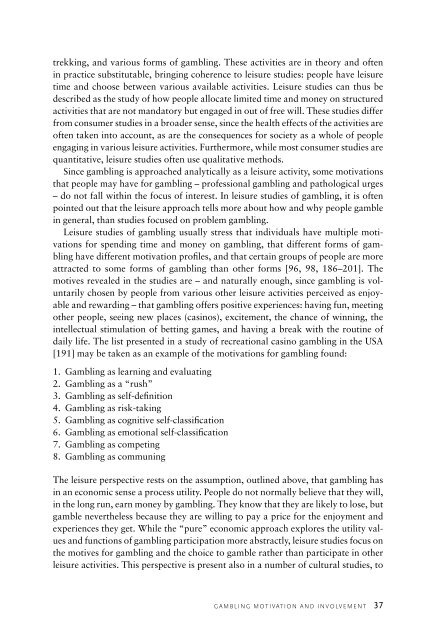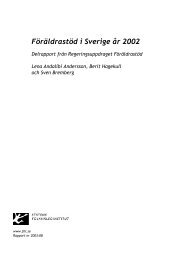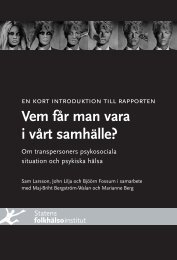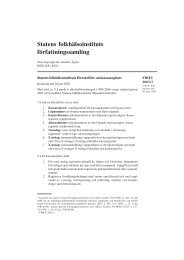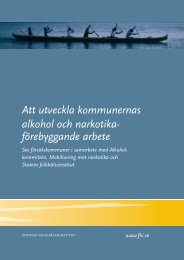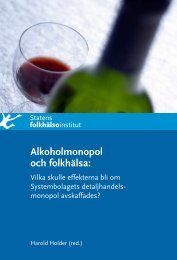Gambling motivation and involvement: A review of social
Gambling motivation and involvement: A review of social
Gambling motivation and involvement: A review of social
You also want an ePaper? Increase the reach of your titles
YUMPU automatically turns print PDFs into web optimized ePapers that Google loves.
trekking, <strong>and</strong> various forms <strong>of</strong> gambling. These activities are in theory <strong>and</strong> <strong>of</strong>ten<br />
in practice substitutable, bringing coherence to leisure studies: people have leisure<br />
time <strong>and</strong> choose between various available activities. Leisure studies can thus be<br />
described as the study <strong>of</strong> how people allocate limited time <strong>and</strong> money on structured<br />
activities that are not m<strong>and</strong>atory but engaged in out <strong>of</strong> free will. These studies differ<br />
from consumer studies in a broader sense, since the health effects <strong>of</strong> the activities are<br />
<strong>of</strong>ten taken into account, as are the consequences for society as a whole <strong>of</strong> people<br />
engaging in various leisure activities. Furthermore, while most consumer studies are<br />
quantitative, leisure studies <strong>of</strong>ten use qualitative methods.<br />
Since gambling is approached analytically as a leisure activity, some <strong>motivation</strong>s<br />
that people may have for gambling – pr<strong>of</strong>essional gambling <strong>and</strong> pathological urges<br />
– do not fall within the focus <strong>of</strong> interest. In leisure studies <strong>of</strong> gambling, it is <strong>of</strong>ten<br />
pointed out that the leisure approach tells more about how <strong>and</strong> why people gamble<br />
in general, than studies focused on problem gambling.<br />
Leisure studies <strong>of</strong> gambling usually stress that individuals have multiple <strong>motivation</strong>s<br />
for spending time <strong>and</strong> money on gambling, that different forms <strong>of</strong> gambling<br />
have different <strong>motivation</strong> pr<strong>of</strong>iles, <strong>and</strong> that certain groups <strong>of</strong> people are more<br />
attracted to some forms <strong>of</strong> gambling than other forms [96, 98, 186–201]. The<br />
motives revealed in the studies are – <strong>and</strong> naturally enough, since gambling is voluntarily<br />
chosen by people from various other leisure activities perceived as enjoyable<br />
<strong>and</strong> rewarding – that gambling <strong>of</strong>fers positive experiences: having fun, meeting<br />
other people, seeing new places (casinos), excitement, the chance <strong>of</strong> winning, the<br />
intellectual stimulation <strong>of</strong> betting games, <strong>and</strong> having a break with the routine <strong>of</strong><br />
daily life. The list presented in a study <strong>of</strong> recreational casino gambling in the USA<br />
[191] may be taken as an example <strong>of</strong> the <strong>motivation</strong>s for gambling found:<br />
1. <strong>Gambling</strong> as learning <strong>and</strong> evaluating<br />
2. <strong>Gambling</strong> as a “rush”<br />
3. <strong>Gambling</strong> as self-definition<br />
4. <strong>Gambling</strong> as risk-taking<br />
5. <strong>Gambling</strong> as cognitive self-classification<br />
6. <strong>Gambling</strong> as emotional self-classification<br />
7. <strong>Gambling</strong> as competing<br />
8. <strong>Gambling</strong> as communing<br />
The leisure perspective rests on the assumption, outlined above, that gambling has<br />
in an economic sense a process utility. People do not normally believe that they will,<br />
in the long run, earn money by gambling. They know that they are likely to lose, but<br />
gamble nevertheless because they are willing to pay a price for the enjoyment <strong>and</strong><br />
experiences they get. While the “pure” economic approach explores the utility values<br />
<strong>and</strong> functions <strong>of</strong> gambling participation more abstractly, leisure studies focus on<br />
the motives for gambling <strong>and</strong> the choice to gamble rather than participate in other<br />
leisure activities. This perspective is present also in a number <strong>of</strong> cultural studies, to<br />
G A M B L I N G M O T I VAT I O N A N D I N V O LV E M E N T 37


